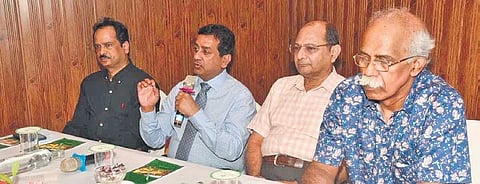Colorectal cancer emerging as a major public health crisis
BHUBANESWAR: Colorectal cancer (CRC) is emerging a major health crisis worldwide, but with no data and studies on the prevalence and burden of the disease, India is at the crossroads, secretary-general of Indian Society of Gastroenterology (ISG) Prof Govind Makharia said here on Sunday.
Speaking to The New Indian Express on the sidelines of the World Digestive Health Day (WDHD) organised by Kalinga Gastroenterology Foundation (KGF) and Odisha chapter of ISG here, Prof Makharia said a pan-India study is being conducted for the first time to ascertain how many people, who underwent colonoscopy, had polyps. “Once the number is found, we can have a fair idea about the burden in the country. It is the third most common cancer in men (10 per cent of all cases) and the second most common in women (9.4 pc of all cases) worldwide,” he said.
Prof Makharia said, related deaths account for 8 pc of all cancer deaths making it the fourth most common cause of death due to cancer. “Most CRCs are sporadic, although genetic factors increase the risk considerably. Risk factors for the disease can be broadly divided into genetic and environmental or lifestyle-related factors. People should not ignore rectum bleeding and they must consult gastroenterologists,” he advised.
The Professor of Gastroenterology and Human Nutrition at AIIMS-New Delhi said every adult aged 50 and above should be screened for colorectal cancer every year. “CRC is preventable. If any polyp is detected during screening, it can be removed. Screening would allow for better outcomes in terms of reducing the disease burden,” he added.
KGF chairman Dr SP Singh said occult blood in the stool can indicate cancer or polyps in the colon or rectum though not all cancers or polyps bleed. “Not all may not opt for colonoscopy. A simple blood test can detect it at an early stage. The fecal occult blood test is available in every lab. Recent data indicate that India has the most significant increase in incidence, followed by Poland. Odisha is not behind as at least 10 pc of the people undergoing colonoscopy are having polyps,” he said.
Inaugurating WDHD-2022, Pro Chancellor of KITTS University Prof Subrat Kumar Acharya emphasised on early diagnosis and proper management colorectal cancer, which is progressively increasing as a public health menace. A symposium on ‘Prevention of Colorectal Cancer’ was organised. Head of Gastroenterology at SCB Prof CR Panda, senior gastroenterologists at Apollo Hospitals Dr Manoj Kumar Sahu and Dr Sushanta Kumar Sethi also spoke.

